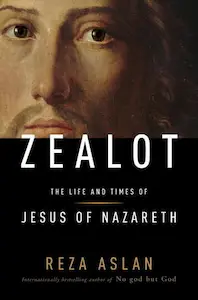Zealot - Summary
Reza Aslan

Introduction
In his thought-provoking book, “Zealot: The Life and Times of Jesus of Nazareth,” Reza Aslan delves into the historical context surrounding the life of Jesus and presents a fresh perspective on the man who would become the central figure of Christianity. Aslan challenges traditional narratives and explores Jesus as a political revolutionary, a zealot who sought to overthrow the Roman occupation of Palestine. Through meticulous research and engaging storytelling, Aslan paints a vivid picture of the world in which Jesus lived, shedding light on his teachings and the impact he had on his followers.
Historical Background: A Divided Palestine
To understand the life and mission of Jesus, Aslan provides a comprehensive overview of the historical and political climate of first-century Palestine. He highlights the deep divisions between the Jewish population and their Roman oppressors, as well as the internal conflicts within Jewish society. The Zealots, a radical Jewish sect, emerge as a central focus of Aslan’s narrative, as they vehemently opposed Roman rule and advocated for armed resistance.
The Life of Jesus: A Revolutionary Prophet
Aslan presents Jesus as a product of his time, deeply influenced by the political turmoil and social unrest that characterized first-century Palestine. He argues that Jesus should be seen as a revolutionary prophet, whose message of the Kingdom of God was not solely focused on the afterlife but also had significant political implications. By examining Jesus’ teachings and actions, Aslan reveals a man who challenged the authority of both the Jewish religious elite and the Roman occupiers.
The Historical Jesus: A Distorted Image
Throughout “Zealot,” Aslan critiques the portrayal of Jesus in the New Testament and argues that the Gospels were written with specific theological agendas in mind. He contends that the image of Jesus presented in the Bible has been distorted over time, as early Christian communities sought to distance themselves from the revolutionary aspects of his message. Aslan draws on historical evidence and textual analysis to reconstruct a more accurate picture of Jesus, emphasizing his role as a political figure and a champion of the poor and marginalized.
The Crucifixion: A Political Act
One of the most pivotal moments in Jesus’ life, the crucifixion, is reexamined by Aslan through a political lens. He argues that Jesus’ execution was not solely a religious act but a deliberate political move by the Roman authorities to suppress any potential uprising. Aslan highlights the parallels between Jesus and other Jewish rebels who were crucified for their opposition to Roman rule, emphasizing the political nature of his death.
The Early Christian Movement: From Zealotry to Universalism
Aslan explores the transformation of Jesus’ message and the subsequent development of the early Christian movement. He traces the shift from a predominantly Jewish sect, focused on the liberation of Palestine, to a universal religion that transcended ethnic boundaries. Aslan contends that the Apostle Paul played a crucial role in reshaping Jesus’ teachings, removing their revolutionary aspects, and opening the door for the spread of Christianity beyond Jewish communities.
Jesus and Women: A Subversive Approach
In “Zealot,” Aslan also examines Jesus’ interactions with women, challenging traditional interpretations of their role in his ministry. He argues that Jesus’ treatment of women was revolutionary for his time, as he defied societal norms and treated them as equals. Aslan draws on biblical passages and historical context to demonstrate how Jesus’ inclusion of women in his inner circle and his interactions with them were subversive acts that challenged the patriarchal structures of his society.
The Legacy of Jesus: A Complex Figure
Aslan concludes “Zealot” by reflecting on the enduring legacy of Jesus and the diverse interpretations of his life and teachings throughout history. He acknowledges that Jesus was a complex figure, often co-opted by different groups to serve their own agendas. Aslan emphasizes the importance of understanding Jesus within his historical context, free from the layers of interpretation that have accumulated over centuries.
Conclusion
Reza Aslan’s “Zealot: The Life and Times of Jesus of Nazareth” offers readers a fresh and thought-provoking perspective on the historical Jesus. By examining the political and social climate of first-century Palestine, Aslan presents Jesus as a revolutionary figure whose message went beyond religious teachings. Through meticulous research and engaging storytelling, Aslan challenges traditional narratives and invites readers to reconsider their understanding of Jesus and his impact on the world. “Zealot” serves as a compelling exploration of the complexities of faith, politics, and the enduring legacy of one of history’s most influential individuals.